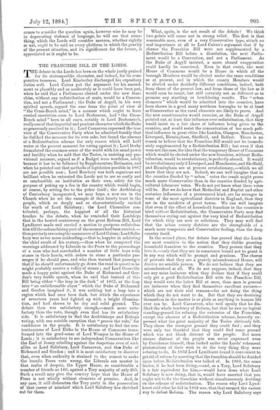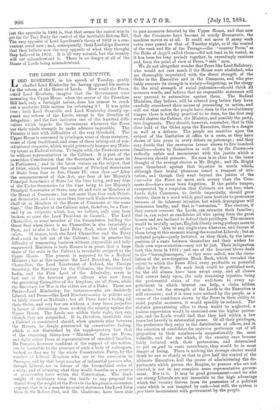THE FRANCHISE BILL IN THE LORDS.
THE debate in the Lords has been on the whole justly praised for its statesmanlike character, and indeed, for its com- parative terseness. Lord Kimberley discharged his expository duties well. Lord Cairns put the argument for his amend- ment as plausibly and as moderately as it could have been put, when he said that a Parliament elected under the new fran- chise, without any redistribution of seats, would be a Conven- tion, and not a Parliament ; the Duke of Argyll, in his very spirited speech, argued the case from the point of view of " the Cross-Bench mind," in a manner which ought to have carried conviction even to Lord Brabourne, had " the Cross- Bench mind " been in all cases, notably in Lord Brabourne's, really one of that impartial and prudent character which the Duke so generously ascribed to it ; Lord Carnarvon expressed the true view of the Conservative Party when he admitted frankly that he disliked the measure for its own sake, but found the absence of a Redistribution scheme the only reason which will hold water at the present moment for voting against it ; Lord Derby formulated the common-sense of the world with his usual power and lucidity when be said that the Tories, in resisting any pro- visional measure, argued as if a Budget were worthless, solely because it has to be followed by Supplementary Estimates, and when he pointed out that methods of legislation possible in 1867 are not possible now ; Lord Rosebery was both sagacious and brilliant when he entreated the Lords not to use so costly and so combustible an institution as their own, solely for the purpose of poking up a fire in the country which would begin, of course, by setting fire to the poker itself ; the Archbishop of Canterbury inaugurated, we may hope, a new era in the Church when he set the example of that hearty trust in the people, which so deeply and so characteristically excited the wrath of Lord Salisbury ; the Lord Chancellor con- tributed, perhaps, the happiest of all the historical touches to the debate, when he reminded their Lordships that in the heated controversy on the great Reform Bill, Lord Lyndhurst made and carried a motion to postpone redistribu- tion till the enfranchising part of the measure had been carried,— thus precisely reversing the manoeuvre of Lord Cairns; Lord Salis- bury was never more misleading,—tbat is, happier in achieving the chief result of his oratory,—than when he compared the warnings addressed by Liberals to the Peers to the proceedings of a man who had marshalled a number of little boys with stones in their hands, with orders to stone a particular pas-
senger if he should pass, and who then warned that passenger that if he should unfortunately go down the road in question he might probably receive a volley of stones ; and Lord Granville made a happy point against the Duke of Richmond and Gor- don's very feeble speech, when he said that instead of this Bill being either " the leap in the dark " of 1867, or the leap into " an unfathomable abyss " which the Duke of Richmond and Gordon imagined it, it was nothing but a leap into a region which had once been dark, but which the experience of seventeen years had lighted up with a bright illumina- tion, and had shown to be dry and solid ground. The debate then was satisfactory enough,—much more satis- factory than the vote, though even that has its satisfactory side. It is satisfactory to find the Archbishops and Bishops voting, with one notable exception that " proves the rule," for confidence in the people. It is satisfactory to find the con- tentiousness of Lord Elcho in the House of Commons trans- formed into the good-sense of Lord Wemyss in the House of Lords ; it is satisfactory to see independent Conservatives like the Earl of Jersey rebelling against the despotism even of such allies as Lord Salisbury, Lord Carnarvon, and thew Duke of Richmond and Gordon ; and it is most satisfactory to discover that, even when authority is strained to the utmost to make the bucolic Peers vote wrong, the Liberals can muster in that realm of despair, the Upper House, so considerable a number of friends as 146, against a Tory majority of only 205. Such a result may give the country hope that the House of Peers is not wholly without elements of promise. And, in any case, it will dishearten the Tory party in the prosecution of that career of mischief which Lord Salisbury has sketched out for them.
What, again, is the net result of the debate? We think two points will come out in strong relief. The first is that reasonable men, even of a very Conservative type, attach no real importance at all to Lord Cairns's argument that if by chance the Franchise Bill were not supplemented by a Redistribution Bill before a dissolution, the next Parlia- ment would be a Convention, and not a Parliament. As the Duke of Argyll insisted, a more absurd exaggeration could hardly be conceived. Even in that event, the next House of Commons would be a House in which all the borough Members would be elected under the same conditions as at present, and in which the county Members would be elected under decidedly different conditions, indeed, both from those of the present law, and from those of the law as it would soon be recast, but still certainly not so different as to promise any startling or bewildering results. The " urban elements " which would be admitted into the counties, have been shown in a good many northern boroughs to be at least as Conservative as the rural elements are likely to prove. And the new constituencies would exercise, as the Duke of Argyll pointed out, at least this influence over redistribution, that they would insist on a fair share of influence being given to the counties, and would resist the concentration of too much poli- tical influence in great cities like London, Glasgow, Manchester, Liverpool, Birmingham, Sheffield, and Belfast. There is no reason to believe that the Franchise Bill would not be immedi- ately supplemented by a Redistribution Bill ; but even if that were not the case, the idea that the temporary House of Commons which would be elected under the new franchise, without Redis- tribution, would be revolutionary, is perfectly absurd. It would be revolutionary only if Liverpool, and Manchester, and Sheffield, and Birmingham are at present revolutionary,—which we all know that they are not. Indeed, we can well imagine that in the counties flooded by " urban " votes the result might prove much more Conservative than in the counties flooded by agri- cultural labourers' votes. We do not yet know what these votes will be. But we do know that Methodist and Baptist and other sectarian influences of a pronounced kind, are far stronger in some of the most agricultural districts in England, than they are in the outskirts of great towns. We can well imagine that even if the effect of household franchise in the counties is tried without Redistribution, the Conservative Party may find themselves crying out against the very kind of Redistribution for which they are now so solicitous. They may well find that the urban county districts are the strongholds of a much more temperate and Conservative feeling, than the deep country itself.
In the second place, the debate has proved that the Lords are most sensitive to the notion that they dislike granting household franchise to the counties. They protest that they love it,—only that they are in conscience bound not to grant it in any way which will be prompt and gracious. The chorus of protests that they are a gravely misunderstood House, will deceive no sensible person. We do not believe that they are misunderstood at all. We do not suppose, indeed, that they are any more insincere when they declare that if they could only get a good Redistribution Bill with the Franchise Bill, they would vote the latter Bill at once, than men in general are insincere when they find themselves excellent excuses— which are not their real reasons —for not doing the thing which they do not want to do. But that they are deceiving themselves in the matter is as plain as anything in human life ever can be. Lord. Carnarvon, who said openly that he dis- liked the whole tendency of Reform, but that he saw no logical standing-ground for refusing the extension of the Franchise, except the absence of a Redistribution scheme, honestly ex- pressed what the great majority of the Tories obviously felt.
They chose the strongest ground they could find ; and they were only too thankful that they could find some ground which was not blank distrust of the people. But more sincere distrust of the people was never expressed even by Coriolanus himself, than lurked under the Lords' vehement protestations of their wish to do the very thing they were refusing to do. In 1832 Lord Lyndhurst found it convenient to get rid of reform by asserting that the franchise should be decided upon before Redistribution was talked of. In 1884, the same leader, if he had been living,—and, as a Tory, Lord Salisbury is a fair equivalent for him,—would have done what Lord Salisbury is now doing, that is, would have asserted that you ought not to fix the franchise without simultaneously deciding on the scheme of redistribution. The reason why Lord Lynd- hurst said what he did in 1832 was, that that seemed the easiest way to defeat Reform. The reason why Lord Salisbury says just the opposite in 1884 is, that that seems the easiest way to get for the Tory Party the control of the inevitable Reform Bill. The very opposite of Lord Lyndhurst's thesis of 1832 is a con- venient creed now ; and, consequently, their Lordships discover that they believe now the very opposite of what they thought they believed in 1832. It is all very natural, but the country will not misunderstand it. There is no danger at all of the House of Lords being misunderstood.

































 Previous page
Previous page